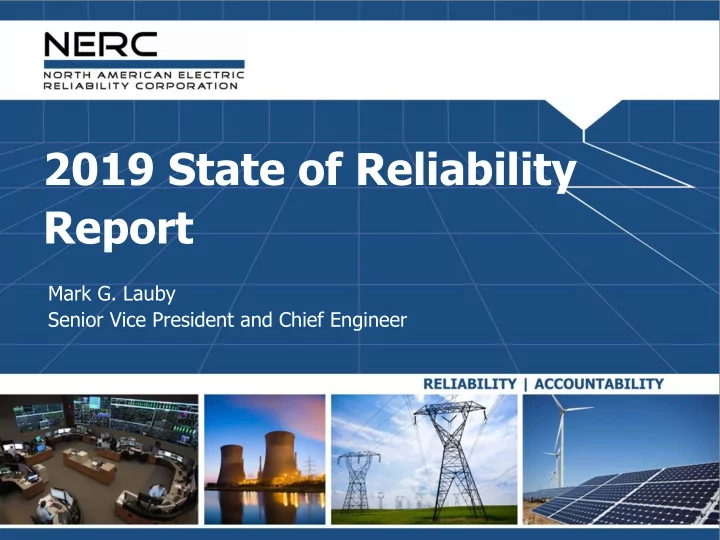

2019 State of Reliability Report Mark G. Lauby Senior Vice President and Chief Engineer
Key Findings and Recommendations • High Reliability in 2018, No Non-Weather Category 3, 4, or 5 events ▪ Hurricane Michael and Florence Category 3 • Extreme weather events continue to be leading contributor to the largest generation and distribution outages • Better than expected performance from Texas generation fleet helped meet 2018 summer peak demand; reliability risk in 2019 due to continued capacity deficit • Continued downward misoperation rate trend • Improving or stable frequency response performance in all interconnections • Emerging reliability challenges identified as more inverter-based generation is added 2 RELIABILITY | ACCOUNTABILITY
By The Numbers 3 RELIABILITY | ACCOUNTABILITY
Event Analysis (2018, Trends, Causes) 4 RELIABILITY | ACCOUNTABILITY
2014-2018 Event Analysis Trends 5 RELIABILITY | ACCOUNTABILITY
6 RELIABILITY | ACCOUNTABILITY
Reliability Indicator – Transmission Related Events Results in Loss of Load 7 RELIABILITY | ACCOUNTABILITY
Reliability Indicator – Protection System Misoperation Rate Annual Protection System Five-Year Protection System Misoperation Rate Misoperation Rate by Region Q4 2013 through Q3 2018 8 RELIABILITY | ACCOUNTABILITY
9 RELIABILITY | ACCOUNTABILITY
Severity Risk Index (SRI) - Sorted 10 RELIABILITY | ACCOUNTABILITY
Severity Risk Index (SRI) – Cumulative 11 RELIABILITY | ACCOUNTABILITY
BPS Planning and Adapting to a Changing Resource Mix • Concerns with inverter-based resource persist and mitigation strategies are being developed by the NERC Inverter- Based Resources Task Force. • NERC Alert helped inform industry of the vulnerabilities associated with momentary cessation. 12 RELIABILITY | ACCOUNTABILITY
Recommendations The ERO and Industry should: 1 - Continue improving their ability to understand, model, and plan for a system with a significantly different resource mix. Priority should be given to: ▪ Frequency response under low inertia conditions ▪ Contributions of inverter-based resources to essential reliability services ▪ Increasing protection system and restoration complexities with increased inverter- based resources ▪ Resource adequacy with increasing energy constraints 2 - Develop comparative metrics to understand the different dimensions of resilience during extreme events and system performance changes over time. 3 - Better understand and share information on cyber and physical security threats and mitigate the risks through a variety of approaches, including resilient system design, consequence-informed planning and operation, and practicing response and recovery processes. 13 RELIABILITY | ACCOUNTABILITY
EMP Task Force Status Update NRC Mark Lauby, Senior Vice President and Chief Engineer
Purpose • May 2019: NERC launched a Task Force to identify reliability concerns associated with EMPs and potential methods for promoting resilience • The Task Force advises NERC, regulators, Regional Entities, and industry stakeholders to establish a common understanding of the scope, priority, and goals for the development of next-steps to address resilience to HEMP events 15 RELIABILITY | ACCOUNTABILITY
EMP Task Force: Phased Approach Strategic Recommendations Phase 1 Technical Committee Work Phase 2 Standard Drafting Team (if applicable) Phase 3 16 RELIABILITY | ACCOUNTABILITY
EMP Task Force: Report Structure • The Task Force has broken up the topic of EMP as it relates to the utility industry in the following categories: ▪ Policy – What needs to be clearly defined by industry and federal government ▪ Research – What research is needed to prudently inform utilities that need to make decisions ▪ Vulnerability Assessments – How does the utility industry take the policy and research to understand its vulnerability ▪ Mitigation Guidelines – Fundamental suggestions and guidelines on prudent mitigation strategies ▪ Response and Recovery – Based on the vulnerability assessments and any mitigation guidelines, for any impacted facilities, how does a utility respond and recover 17 RELIABILITY | ACCOUNTABILITY
18 RELIABILITY | ACCOUNTABILITY
Recommend
More recommend